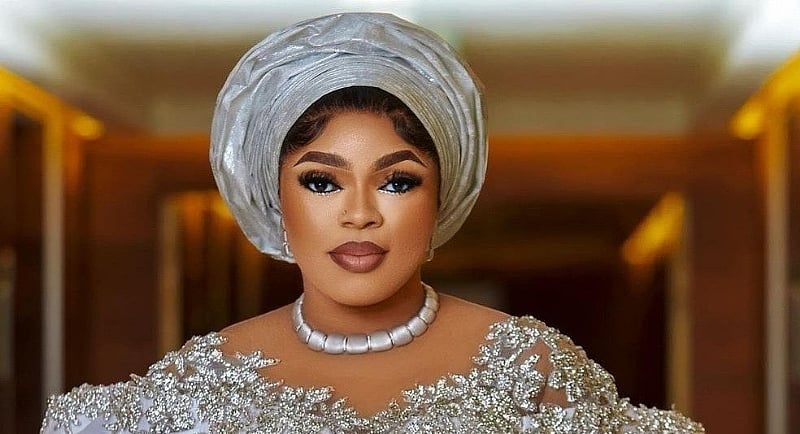The declaration of Nigerian cross-dresser, Idris Okuneye, popularly known as Bobrisky, that he now identifies as a woman has ignited another wave of controversy and public discourse around gender identity, societal acceptance, and the evolving landscape of social norms. Bobrisky’s announcement, disseminated via his influential Instagram platform, emphatically asserts his transition to womanhood, claiming to have completed all necessary procedures to solidify this transformation. His statement, “It’s time y’all accept Bob is now a woman. Have done everything, congratulations to me,” reflects a strong desire for validation and recognition of his self-proclaimed female identity. This declaration, while potentially empowering for Bobrisky personally, simultaneously challenges traditional conceptions of gender within Nigerian society and beyond, prompting critical conversations about the definition of womanhood, the role of physical attributes in gender identity, and the broader societal implications of such public declarations.
Bobrisky’s assertive stance further extends to his capacity to engage in intimate relationships, mirroring the experiences of cisgender women. This assertion underscores his conviction that he now embodies the full spectrum of womanhood, encompassing not just physical changes but also the social and relational aspects of female identity. He confidently posits that he can now partake in intimate relations just like other women, thereby rejecting any notion of incompleteness or inadequacy in his transition. This bold declaration challenges traditional views linking womanhood solely to biological attributes, emphasizing instead the lived experience and self-perception of gender identity. Furthermore, by daring critics to question his womanhood, specifically regarding the presence of a womb, he preemptively addresses a common argument used to invalidate transgender identities. His statement, “Before you open your dirty mouth to ask if I have a womb, I don’t need it,” underscores his belief that a womb is not a prerequisite for womanhood and that his identity is valid regardless of biological factors.
Bobrisky’s narrative also weaves in a complex commentary on societal dynamics, particularly relating to marital relationships and financial transactions. He highlights the material benefits he receives from married men, framing it as a preferable alternative to bearing children, which he believes could disrupt these men’s families. This aspect of his narrative introduces a nuanced discussion on the intersection of gender identity, economic agency, and the complexities of relationships. While some may interpret his statements as promoting infidelity or exploiting vulnerable situations, others might see it as an expression of his autonomy and financial independence in a world often hostile to transgender individuals. His statement, “I love how dis married men spends heavily on me and I don’t have to keep unwanted child for him to destroy his happy home. I’m here to keep marriages intact,” reveals a layered perspective on his role in these relationships, positioning himself as a protector of family structures rather than a disruptor.
Beyond the immediate controversy, Bobrisky’s public declaration of womanhood has broader implications for the discourse on transgender rights and representation in Nigeria. His prominence as a social media influencer amplifies his message, reaching a wide audience and potentially fostering greater visibility and understanding of transgender identities. However, this visibility also comes with increased scrutiny and potential backlash from conservative elements within society. Bobrisky’s decision to publicly embrace his identity challenges the status quo and can inspire other transgender individuals to find their voice and advocate for their rights. His story embodies the ongoing struggle for acceptance and recognition faced by transgender people globally, particularly in societies where traditional gender norms hold sway.
The complex intersection of Bobrisky’s identity, his financial independence, and his relationships with married men highlights the multifaceted reality of many transgender individuals who often navigate challenging social and economic landscapes. His narrative forces a confrontation with ingrained societal prejudices and biases surrounding gender identity, sexuality, and economic agency. While his lifestyle choices may be controversial, they provide a glimpse into the diverse ways in which individuals navigate and negotiate their identities and relationships within a complex social fabric. It underscores the need for greater empathy, understanding, and nuanced conversations around gender identity, moving beyond reductive labels and stereotypes.
In conclusion, Bobrisky’s declaration of womanhood serves as a potent catalyst for important conversations about gender identity, social acceptance, and the evolving understanding of what it means to be a woman. While his story is uniquely his own, it resonates with larger societal trends and reflects the ongoing struggle for recognition and inclusion faced by transgender individuals worldwide. His public pronouncements challenge conventional norms, ignite debate, and ultimately contribute to a broader societal evolution towards greater acceptance and understanding of diverse gender expressions. The discourse surrounding Bobrisky’s transition highlights the importance of fostering open dialogue and challenging preconceived notions about gender, paving the way for a more inclusive and accepting future.














